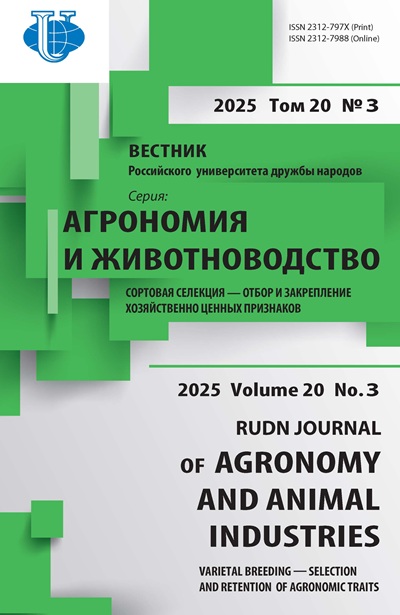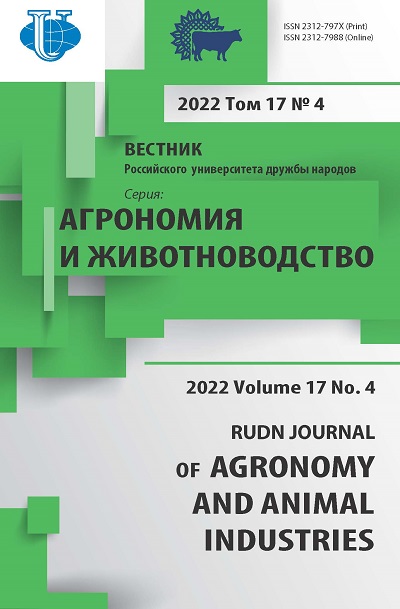Microbial diversity in the cecum of broiler chickens after introduction of coumarin and feed antibiotic into the diet
- Authors: Duskaev G.K.1, Lazebnik K.S.1, Klimova T.A.1
-
Affiliations:
- Federal Research Centre of Biological Systems and Agrotechnologies of the RAS
- Issue: Vol 17, No 4 (2022)
- Pages: 555-566
- Section: Veterinary science
- URL: https://agrojournal.rudn.ru/agronomy/article/view/19837
- DOI: https://doi.org/10.22363/2312-797X-2022-17-4-555-566
- ID: 19837
Cite item
Full Text
Abstract
In modern world, there is a need to search for alternatives to antibiotics due to the growing resistance of microorganisms. Plant extracts can be a promising replacement. Due to biological functions, they can suppress the development of various processes associated with pathogenicity and virulence, in particular, the Quorum sensing process. Based on the above, the aim of the study was to assess the bioactivity of 7,8-dihydroxy-4- methylcoumarin and 20% chlortetracycline in relation to the microbial diversity of the cecum of broiler chickens. 4 groups of broiler chickens were formed for the experiment. The control group received a diet without additives (basic diet (BD)); group I - BD + 20% chlortetracycline, at the dosage 0.63 g/kg bw per day, group II - BD + 7,8-dihydroxy-4-methylcoumarin at a dose of 9.0 mcg/ kg bw per day; Group III - BD + 7,8-dihydroxy-4-methylcoumarin + 20% chlortetracycline. The NGS of the 16S rRNA gene was used as a research method. Analysis of the results showed that addition of coumarin, the antibiotic and their combination to the poultry diet had an impact on formation of the microbial composition of intestine. Moreover, there was a decrease in the number of Lactobacillaceae , Lachnospiraceae and Erysipelotrichaceae families. In addition, the proportion of opportunistic Streptococcus flora decreased more than by 10 %.
Keywords
Full Text
Characterization of the diversity of microbial communities in cecum of broiler chickens
Group | Number of reads | ОТU | Number of phyla |
Control | 29923 | 326 | 4 |
I | 19540 | 293 | 5 |
II | 22824 | 291 | 5 |
III | 24740 | 323 | 5 |
Microbiome of cecum of broiler chickens at the level of phylum (A), families (B) and genera (C)
About the authors
Galimzhan K. Duskaev
Federal Research Centre of Biological Systems and Agrotechnologies of the RAS
Author for correspondence.
Email: gduskaev@mail.ru
ORCID iD: 0000-0002-9015-8367
Doctor of Biology, Leading Researcher, Department of Feeding Agricultural Animals and Feed Technology, Deputy Director
29 9 Yanvarya st., Orenburg, 460000, Russian FederationKristina S. Lazebnik
Federal Research Centre of Biological Systems and Agrotechnologies of the RAS
Email: christinakondrashova94@yandex.ru
ORCID iD: 0000-0003-4907-9656
Junior Researcher, Laboratory of Molecular Genetic Research in Animal Husbandry
29 9 Yanvarya st., Orenburg, 460000, Russian FederationTatyana A. Klimova
Federal Research Centre of Biological Systems and Agrotechnologies of the RAS
Email: klimovat91@mail.ru
ORCID iD: 0000-0003-4298-1663
Researcher, Laboratory of Microbiology
29 9 Yanvarya st., Orenburg, 460000, Russian FederationReferences
- Cegelski L, Marshall GR, Eldridge GR, Hultgren SJ. The biology and future prospects of antivirulence therapies. Nat Rev Microbiol. 2008;6(1):17-27. doi: 10.1038/nrmicro1818
- Cooper MA, Shlaes D. Fix the antibiotics pipeline. Nature. 2011;472:32. doi: 10.1038/472032a
- LaSarre B, Federle MJ. Exploiting quorum sensing to confuse bacterial pathogens. Microbiol Mol Biol Rev. 2013;77(1):73-111. doi: 10.1128/Mmbr.00046-12
- De la Fuente-Núñez C, Korolik V, Bains M, Nguyen U, Breidenstein EBM, Horsman S, Lewenza S, Burrows L, Hancock RE. Inhibition of bacterial biofilm formation and swarming motility by a small synthetic cationic peptide. Antimicrobial Agents and Chemotherapy. 2012;56(5):2696-2704. doi: 10.1128/AAC.00064-12
- Reen FJ, Gutiérrez-Barranquero JA, Parages ML, O’Gara F. Coumarin: a novel player in microbial quorum sensing and biofilm formation inhibition. Appl Microbiol Biotechnol. 2018;102:2063-2073. doi: 10.1007/s00253-018-8787-x
- Zhu N, Wang J, Yu L, Zhang Q, Chen K, Liu B. Modulation of growth performance and intestinal microbiota in chickens fed plant extracts or virginiamycin. Front Microbiol. 2019;10:1333. doi: 10.3389/fmicb.2019.01333
- Rudenko PA, Vatnikov YA, Rudenko AA, Rudenko VB. Epizootic analysis of livestock farms disadvantaged by factor infections. Scientific life. 2020;15(4):572-585. (In Russ.). doi: 10.35679/1991-9476-2020-15-4-572-585
- Vatnikov Y, Shabunin S, Kulikov E, Karamyan A, Lenchenko E, Sachivkina N, Lenchenko E, Karamyan A, Kulikov E, Shabunin S. Effectiveness of biologically active substances from Hypericum perforatum L. in the complex treatment of purulent wounds. International Journal of Pharmaceutical Research. 2020;12(4):1108-1117. doi: 10.31838/19ijpr/2020.12.04.078
- Wong SYY, Grant IR, Friedman M, Elliott CT, Situ C. Antibacterial activities of naturally occurring compounds against Mycobacterium avium subsp. paratuberculosis. Appl Environ Microbiol. 2008;74(19):5986- 5990. doi: 10.1128/AEM.00981-08
- Al-Majedy YK, Al-Duhaidahawi DL, Al-Azawi KF, Al-Amiery AA, Kadhum AAH, Mohamad AB. Coumarins as potential antioxidant agents complemented with suggested mechanisms and approved by molecular modeling studies. Molecules. 2016;21(2):135. doi: 10.3390/molecule
- D’Almeida RE, Molina RDI, Viola CM, Luciardi MC, Nieto Peñalver C, Bardon A, Arena ME. Comparison of seven structurally related coumarins on the inhibition of Quorum sensing of Pseudomonas aeruginosa and Chromobacterium violaceum. Bioorg Chem. 2017;73:37-42. doi: 10.1016/j.bioorg.2017.05.011
- Yang L, Ding W, Xu Y, Wu D, Li S, Chen J, Guo B. New Insights into the Antibacterial Activity of Hydroxycoumarins against Ralstonia solanacearum. Molecules. 2016; 21(4):468. doi: 10.3390/molecules21040468
- Deryabin D, Inchagova K, Rusakova E, Duskaev G. Coumarin’s anti-quorum sensing activity can be enhanced when combined with other plant-derived small molecules. Molecules. 2021;26(1):208. doi: 10.3390/molecules26010208
- Stanley D, Denman SE, Hughes RJ, Geier MS, Crowley TM, Chen H, Haring VR, Moore RJ. Intestinal microbiota associated with differential feed conversion efficiency in chickens. Appl Microbiol Biotechnol. 2012;96:1361-1369. doi: 10.1007/s00253-011-3847-5
- Videnska P, Faldynova M, Juricova H, Babak V, Sisak F, Havlickova H, Rychlik I. Chicken faecal microbiota and disturbances induced by single or repeated therapy with tetracycline and streptomycin. BMC Vet Res. 2013;9:30. doi: 10.1186/1746-6148-9-30
- Turnbaugh PJ, Ley RE, Mahowald MA, Vincent M, Mardis ER, Gordon JI. An obesity-associated gut microbiome with increased capacity for energy harvest. Nature. 2006;444:1027-1031. doi: 10.1038/nature05414
- Torok VA, Allison GE, Percy NJ, Ophel-Keller K, Hughes RJ. Influence of antimicrobial feed additives on broiler commensal posthatch gut microbiota development and performance. Appl Environ Microbiol. 2011;77:3380-3390. doi: 10.1128/AEM.02300-10
- Thiennimitr P, Winter SE, Winter MG, Xavier MN, Tolstikov V, Huseby DL, Sterzenbach T, Tsolis RM, Roth JR, Bäumler AJ. Intestinal inflammation allows Salmonella to use ethanolamine to compete with the microbiota. PNAS. 2011;108(42):17480-17485. doi: 10.1073/pnas.1107857108
- Winter SE, Thiennimitr P, Winter MG, Butler BP, Huseby DL, Crawford RW, Russell JM, Bevins CL, Adams LG, Tsolis RM, Roth JR, Bäumler AJ. Gut inflammation provides a respiratory electron acceptor for Salmonella. Nature. 2010;467:426-429. doi: 10.1038/nature09415
- Medvecky M, Cejkova D, Polansky O, Karasova D, Kubasova T, Cizek A, Rychlik I. Whole genome sequencing and function prediction of 133 gut anaerobes isolated from chicken caecum in pure cultures. BMC Genomics. 2018;19(1):561. doi: 10.1186/s12864-018-4959-4
- Yang Q, Liang Q, Balakrishnan B, Belobrajdic DP, Feng QJ, Zhang W. Role of Dietary Nutrients in the Modulation of Gut Microbiota: A Narrative Review. Nutrients. 2020;12(2):381. doi: 10.3390/nu12020381
- Zackular JP, Baxter NT, Iverson KD, Sadler WD, Petrosino JF, Chen GY, Schloss PD. The gut microbiome modulates colon tumorigenesis. mBio. 2013;4(6): e00692-13. doi: 10.1128/mBio.00692-13
- Olnood CG, Beski SSM, Choct M, Iji PA. Novel probiotics: their effects on growth performance, gut development, microbial community and activity of broiler chickens. Animal Nutrition. 2015;1(3):184-191. doi: 10.1016/j.aninu.2015.07.003.43
- Vatnikov Y, Shabunin S, Karamyan A, Kulikov E, Sachivkina N., Stepanishin V, Vasilieva E, Bobkova N, Lucay V, Avdotin V, Zenchenkova A, Rudenko P, Rudenko A. Antimicrobial activity of Hypericum perforatum L. International Journal of Pharmaceutical Research. 2020;12(Suppl.1):723-730. doi: 10.31838/ijpr/2020.SP1.113
- Videnska P, Sedlar K, Lukac M, Faldynova M, Gerzova L, Cejkova D, Sisak F, Rychlik I. Succession and replacement of bacterial populations in the caecum of egg laying hens over their whole life. PLoS One. 2014;9(12):e115142. doi: 10.1371/journal.pone.0115142
- Grozina AA. Gut microbiota of broiler chickens influenced by probiotics and antibiotics as revealed by T-RFLP and RT-PCR. Agricultural biology. 2014;49(6):46-58. (In Russ.). doi: 10.15389/agrobiology.2014.6.46eng
- Yu M, Mu C, Zhang C, Yang Y, Su Y, Zhu W. Marked response in microbial community and metabolism in the ileum and cecum of suckling piglets after early antibiotics exposure. Front Microbiol. 2018;9:1166. doi: 10.3389/fmicb.2018.01166
- Mancabelli L, Ferrario C, Milani C, Mangifesta M, Turroni F, Duranti S, Lugli GA, Viappiani A, Ossiprandi MC, van Sinderen D, Ventura M. Insights into the biodiversity of the gut microbiota of broiler chickens. Environ Microbiol. 2016;18(12):4727-4738. doi: 10.1111/1462-2920.13363
- Ilyina, LA, Yildirim, EA, Nikonov IN, Filippova VA, Laptev GY, Novikova NI, Grozina A.A., Lenkova T.N., Manukyan V.A., Fisinin V.I., Egorovet I.A. Taxons of chicken cecum microbiom are abundant, and influenced by the combined feed composition and decreased metabolizable energy. Agricultural biology. 2015;50(6):817-824. (In Russ.). doi: 10.15389/agrobiology.2015.6.817rus
- Rychlik I. Composition and Function of Chicken Gut Microbiota. Animals. 2020;10(1):103. doi: 10.3390/ani10010103
- Duskaev G, Kvan O, Kosyan D, Rakhmatullin S, Levakhin G. Coumarin derivative and Bacillus cereus change live weight and cecal ecology in broilers. AIMS Agriculture and Food. 2021;6(1):360-380. doi: 10.3934/ agrfood.2021022
Supplementary files
















